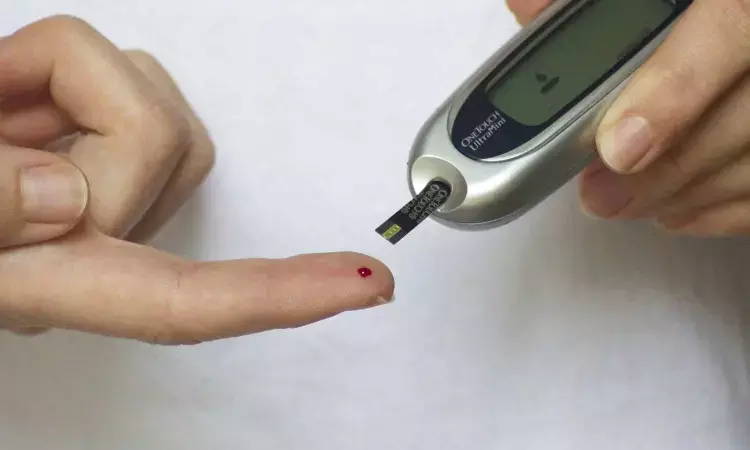- Home
- Medical news & Guidelines
- Anesthesiology
- Cardiology and CTVS
- Critical Care
- Dentistry
- Dermatology
- Diabetes and Endocrinology
- ENT
- Gastroenterology
- Medicine
- Nephrology
- Neurology
- Obstretics-Gynaecology
- Oncology
- Ophthalmology
- Orthopaedics
- Pediatrics-Neonatology
- Psychiatry
- Pulmonology
- Radiology
- Surgery
- Urology
- Laboratory Medicine
- Diet
- Nursing
- Paramedical
- Physiotherapy
- Health news
- Fact Check
- Bone Health Fact Check
- Brain Health Fact Check
- Cancer Related Fact Check
- Child Care Fact Check
- Dental and oral health fact check
- Diabetes and metabolic health fact check
- Diet and Nutrition Fact Check
- Eye and ENT Care Fact Check
- Fitness fact check
- Gut health fact check
- Heart health fact check
- Kidney health fact check
- Medical education fact check
- Men's health fact check
- Respiratory fact check
- Skin and hair care fact check
- Vaccine and Immunization fact check
- Women's health fact check
- AYUSH
- State News
- Andaman and Nicobar Islands
- Andhra Pradesh
- Arunachal Pradesh
- Assam
- Bihar
- Chandigarh
- Chattisgarh
- Dadra and Nagar Haveli
- Daman and Diu
- Delhi
- Goa
- Gujarat
- Haryana
- Himachal Pradesh
- Jammu & Kashmir
- Jharkhand
- Karnataka
- Kerala
- Ladakh
- Lakshadweep
- Madhya Pradesh
- Maharashtra
- Manipur
- Meghalaya
- Mizoram
- Nagaland
- Odisha
- Puducherry
- Punjab
- Rajasthan
- Sikkim
- Tamil Nadu
- Telangana
- Tripura
- Uttar Pradesh
- Uttrakhand
- West Bengal
- Medical Education
- Industry
Tirzepatide use linked to GI adverse events in dose dependant manner

USA: A systematic review published in the Journal of the Endocrine Society details the incidence rate of each adverse event at three tirzepatide doses (5, 10, and 15 mg).
The researchers revealed gastrointestinal adverse events to be the most commonly encountered AEs with incidence rates of up to 50% with the 15-mg dose of tirzepatide. For the majority of GI AEs, they found a dose-dependent relationship, with higher doses being associated with higher incidence rates of adverse events. The researchers note severe hypoglycemia, acute pancreatitis, fatal AEs, cholecystitis, and cholelithiasis to be rare with this medication.
Tirzepatide is a dual glucagon-like peptide-1 receptor agonist (GLP-1 RA) and glucose-dependent insulinotropic peptide (GIP) that got approval from the US Food and Drug Administration (FDA) in May 2022 for type 2 diabetes (T2D) patients.
Rahul Mishra, Cleveland Clinic Foundation, Cleveland, Ohio, USA, and colleagues aimed to determine the rates of individual adverse events related to 3 studied doses of tirzepatide. The study also evaluated rare adverse events linked with tirzepatide, including gall bladder and pancreatic adverse events besides common AEs associated with tirzepatide.
For this purpose, the researchers performed a systematic review with meta-analysis comprising five databases for all clinical trials reporting adverse events related to tirzepatide. From each study, they extracted safety data and analyzed it through meta-regression to assess rates of individual adverse events.
National Heart, Lung, and Blood Institute Quality Assessment Tool was used to perform study quality assessment. Ten trials consisting of 6836 participants were included.
The authors reported the following findings:
- Gastrointestinal AEs were the most commonly reported AEs and were dose-dependent at 39%, 46%, and 49% for the 5, 10, and 15 mg doses, respectively.
- Among all GI AEs, nausea and diarrhoea were most frequent at any dose of tirzepatide.
- Drug discontinuation due to AEs was highest with the 15 mg dose of tirzepatide (10%).
- Incidence of mild hypoglycemia (blood glucose < 70 mg/dL) was highest with tirzepatide 10 mg dose 22.6%.
- Rates of fatal AEs, severe hypoglycemia, acute pancreatitis, cholelithiasis, and cholecystitis were meagre (≤ 1%) across all doses of tirzepatide.
"We found gastrointestinal AEs to be the most common adverse events tied to tirzepatide use, including constipation, diarrhoea, decreased appetite, dyspepsia, vomiting, and nausea," the researchers wrote. "Tirzepatide was found to have a similar adverse events profile as GLP-1 RA."
They noted that, as evidenced by a dose-dependent HbA1c in prior studies, tirzepatide has been considered a great addition to next-generation medications for type 2 diabetes.
"Our study showed that tirzepatide is safe and has a tolerable AE profile and is expected to play a huge role in the management of T2DM, insulin resistance, and weight loss soon," they concluded.
Reference:
Rahul Mishra, Rishi Raj, Ghada Elshimy, Isain Zapata, Lakshmi Kannan, Priyanka Majety, Dinesh Edem, Ricardo Correa, Adverse Events Related to Tirzepatide, Journal of the Endocrine Society, Volume 7, Issue 4, April 2023, bvad016, https://doi.org/10.1210/jendso/bvad016
Dr Kamal Kant Kohli-MBBS, DTCD- a chest specialist with more than 30 years of practice and a flair for writing clinical articles, Dr Kamal Kant Kohli joined Medical Dialogues as a Chief Editor of Medical News. Besides writing articles, as an editor, he proofreads and verifies all the medical content published on Medical Dialogues including those coming from journals, studies,medical conferences,guidelines etc. Email: drkohli@medicaldialogues.in. Contact no. 011-43720751


